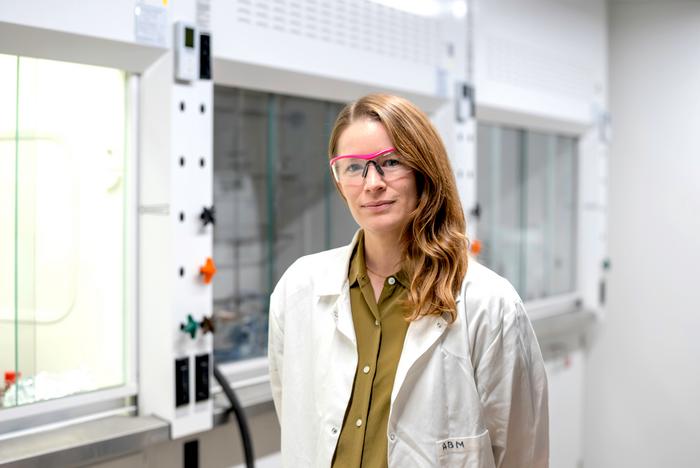HOUSTON – (Jan. 19, 2024) – Amanda Marciel describes her current research, supported by a CAREER Award from the National Science Foundation, as an effort to understand and make “really soft, stretchable stuff.”

Credit: (Photo by Gustavo Raskosky/Rice University)
HOUSTON – (Jan. 19, 2024) – Amanda Marciel describes her current research, supported by a CAREER Award from the National Science Foundation, as an effort to understand and make “really soft, stretchable stuff.”
Expressed more formally, she works at the molecular level to design branch elastomers that return to their original shape after being stretched.
“What I’m doing is creating synthetic networks that have a gel-like softness and are highly elastic for such applications as stretchable electronics and biomimetic tissues,” said Marciel, assistant professor and William Marsh Rice Trustee Chair of chemical and biomolecular engineering at Rice.
The five-year, $670,406 award will enable Marciel to study the efficacy of such soft materials and better understand the underlying structure and mechanical properties of comb polymer networks. These are branched molecules with a relatively low density of side chains arranged along a central backbone.
The highly competitive five-year NSF grants are given to early career faculty members who demonstrate the potential to serve as academic models and leaders in research and education. The NSF gives about 500 such awards across all disciplines each year.
“Comb and bottlebrush elastomers have unusual mechanical properties because their stiffness and elasticity can be manipulated by varying the sidechain length and spacing and cross-link spacing,” Marciel said. “Because of synthetic limitations, though, the cross-link and sidechain uniformity and spacing are difficult to control and characterize experimentally.”
Marciel said she sees a critical need for an experimental platform that can efficiently control such structural differences to determine the structure-function relationships in branch polymer elastomers. In her research, Marciel will draw on polymer synthesis, X-ray and neutron scattering and solution-melt dynamics.
“My goal is to create a new paradigm for designing elastomers,” Marciel said. “The research has four aims: to determine the role of comb polymer topology in forming elastomers, understanding the effects of that topology on elastomer mechanics, characterizing its effects on elastomer structure and increasing the intellectual diversity in soft matter research.”
In addition to the planned research, the award will also help establish research opportunities for undergraduates and support underrepresented scientists and engineers in soft matter research. This endeavor will be accomplished through development of a new symposium at the annual Texas Soft Matter Meeting. Included will be a soft matter laboratory module for community college teachers; summer research presentations by students enrolled in the Research Experiences for Undergrads program at Rice; and promotion of interdisciplinary collaboration.
Marciel earned her Ph.D. in biophysics from the University of Illinois at Urbana-Champaign in 2015, spent three years as a postdoctoral researcher in the Institute for Molecular Engineering at the University of Chicago and joined the Rice faculty in 2019.
-30-
This release was authored by Patrick Kurp and can be found online at news.rice.edu.
Follow Rice News and Media Relations via Twitter @RiceUNews.
Award information:
https://www.nsf.gov/awardsearch/showAward?AWD_ID=2338550&HistoricalAwards=false
Image downloads:
https://news-network.rice.edu/news/files/2024/01/231204_Amanda-Marciel-for-NSF-Career-Award_Gustavo-4-eacd5af1348ee416.jpg
CAPTION: Amanda Marciel is assistant professor and William Marsh Rice Trustee Chair of chemical and biomolecular engineering at Rice University.
(Photo by Gustavo Raskosky/Rice University)
Related stories:
Rice U.’s Kaiyu Hang wins NSF CAREER Award:
https://news.rice.edu/news/2023/rice-us-kaiyu-hang-wins-nsf-career-award
Imagining the possibilities of polymers:
https://chbe.rice.edu/news/imagining-possibilities-polymers
Links:
Department of Chemical and Biomolecular Engineering: https://chbe.rice.edu/
Research Experiences for Undergrads at Rice University: https://reu.rice.edu/
Marciel Soft Matter Lab: https://marciellab.rice.edu/
George R. Brown School of Engineering: https://engineering.rice.edu/
About Rice:
Located on a 300-acre forested campus in Houston, Rice University is consistently ranked among the nation’s top 20 universities by U.S. News & World Report. Rice has highly respected schools of architecture, business, continuing studies, engineering, humanities, music, natural sciences and social sciences and is home to the Baker Institute for Public Policy. With 4,574 undergraduates and 3,982 graduate students, Rice’s undergraduate student-to-faculty ratio is just under 6-to-1. Its residential college system builds close-knit communities and lifelong friendships, just one reason why Rice is ranked No. 1 for lots of race/class interaction, No. 2 for best-run colleges and No. 12 for quality of life by the Princeton Review. Rice is also rated as a best value among private universities by Kiplinger’s Personal Finance.



